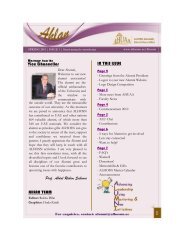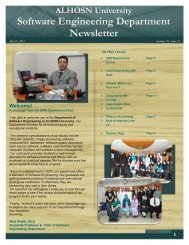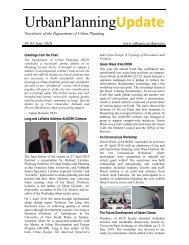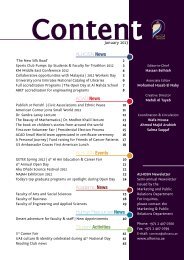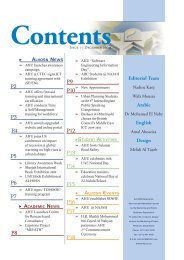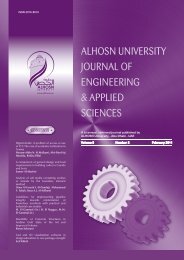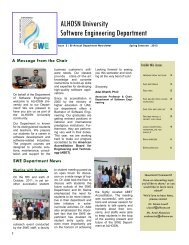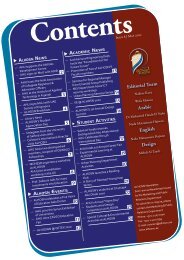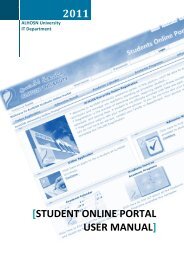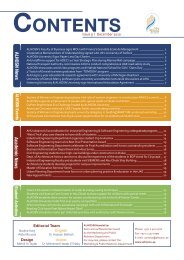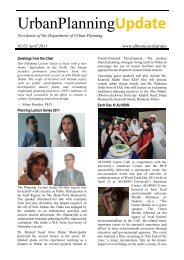ALHOSN University Catalogue Global Knowledge with Local Vision ...
ALHOSN University Catalogue Global Knowledge with Local Vision ...
ALHOSN University Catalogue Global Knowledge with Local Vision ...
You also want an ePaper? Increase the reach of your titles
YUMPU automatically turns print PDFs into web optimized ePapers that Google loves.
Engineering Metrology, Quality control, and related subjects. Labs will be used to demonstrate the operation and<br />
capabilities of machine tools and devices used in engineering Metrology.<br />
IND 307 Thermofluids (3 = 2 + 1)<br />
Prerequisite: FES 231<br />
The scope and limitations of thermodynamics, macroscopic-approach heat, work, energy and first law.<br />
Properties and state of simple substances and fluids. Control-mass and control-volume energy analysis. The<br />
second law of thermodynamics, entropy limiting cycle efficiencies, criteria for equilibrium. Conservation<br />
equations for the flow of fluids. Application to one dimensional fluid flow.<br />
IND 312 Introduction to Engineering Management (3 = 3 + 0)<br />
Co-requisite: FAS 120<br />
This study of the theories and practices of Management begins <strong>with</strong> an understanding of the environment in<br />
which they operate. This includes the task of the worker, the typical industrial organization, the formation and<br />
operation of a trade union. Case studies and in-plant assignments may be employed. The latest management<br />
theories and applications will be examined. The Japanese industrial organization and the new role of Management<br />
will be studied.<br />
IND 314 Algorithms and Web-Based Systems (3 = 2 + 1)<br />
Prerequisites: FES 111, FES 201<br />
The first part of this course is concerned <strong>with</strong> the design and analysis of algorithms. Topics include algorithm<br />
analysis and design, data structures, basic algorithms for searching and sorting, recursion, list processing. The<br />
second part of this course is an introduction to web programming. Topics include HTML fundamentals.<br />
Assignments will involve programming online search routines and web-based industrial engineering applications.<br />
IND 316 Electric Circuits (3 = 2 + 1)<br />
Prerequisite: FES 230<br />
Fundamentals of electricity and electronics for non-electrical engineering students. Passive electrical components<br />
and electrical power sources. Characteristics of electric circuits, both d.c. and a.c. Circuit analysis and theorems.<br />
Steady-state, transient, and resonant modes. Dependant sources and amplifiers. The operational amplifier in various<br />
small-signal and large-signal situations. Instrumentation applications using resistive input transducers<br />
IND 318 Facilities Design (3 = 3 + 0)<br />
Prerequisites: IND 303, IND 305<br />
Principles and practices in layout and material handling for design of industrial and service facilities. Analytical<br />
treatment of facilities location, physical layout, material flow and handling. Integration of product, process and<br />
functional design of facilities. Use of design projects for applying fundamental concepts.<br />
IND 401 Operations Research I (3 = 2 + 1)<br />
Prerequisite: IND 314<br />
Study of the basic principles of Operations Research <strong>with</strong> special emphasis on the paradigms associated <strong>with</strong><br />
linear programming and queuing theory. These include generic modeling; mathematical modeling; the “max”,<br />
“min”, and “mixed case” simplex algorithms; sensitivity analysis; duality; “assignment”, “transportation” and<br />
“trans-shipment” models; and basic principles and models associated <strong>with</strong> queuing or “waiting-line” problems.<br />
IND 403 Modeling and Simulation (3 = 2 + 1)<br />
Prerequisites: FES 203, IND 314<br />
Simulation models of discrete and continuous, deterministic and stochastic systems in terms of procedural<br />
behaviors. Dynamic simulation models will also be studied. Formulating and implementing simulation models,<br />
verification and validation of models, analysis of input and output data, statistical techniques for comparing<br />
alternative systems. Computer simulation languages and simulators will be introduced.<br />
IND 405 Quality Assurance (3 = 3 + 0)<br />
Prerequisites: FES 203, IND 312<br />
Introduction to the design of experiments as well as statistical quality control. Topics on experimental design<br />
include single-factor experiments, block designs, factorial designs, 2-factor experiments and Taguchi’s approach<br />
to parameter design. Topics on quality control include product flow chart, cause- effect diagram, Pareto Analysis,<br />
statistical process control, acceptance sampling and Taguchi’s approach to quality.<br />
109



